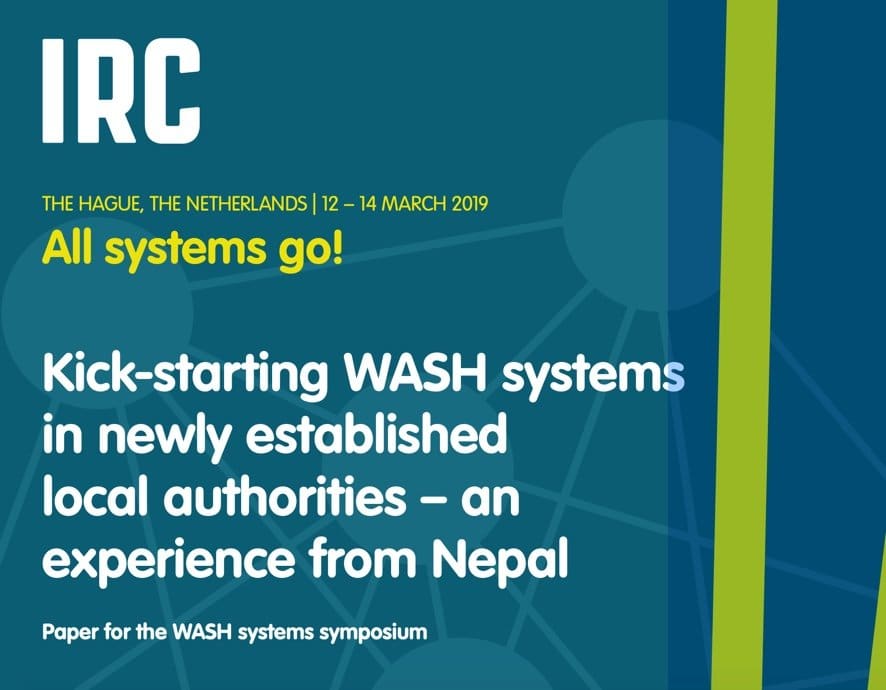Nepal
Agenda for Change members working on systems approaches
Please note this is a summary of information. You can learn more on the Aguaconsult, Helvetas, WaterAid, and Welthungerhilfe websites.
Through the Sustainable Services Initiative, CARE Nepal, Helvetas Nepal, Splash/Smart Paani, Water Aid Nepal, and Welthungerhilfe are supporting systems strengthening work in Nepal by supporting local authorities and advising local entrepreneurs to ensure water access and management for school children, adolescent girls, and women. Aguaconsult also provided technical support for the application of the Agenda for Change Roadmap in five local authorities (palikas) in the Chitwan and Siraha districts.
CARE Nepal works closely with local governments to empower the communities in the Lumbini and Sudurpaschim provinces, using a sustainable planning approach with co-design and co-creation initiatives to strengthen the WASH system in Nepal.
Helvetas Nepal works with local communities to promote the protection and sustainable usage of water resources, including a focus on supplying clean drinking water, building latrines, and efficient irrigation methods in 5 districts in the Karnali and Sudurpaschim provinces.
WaterAid Nepal helps marginalised communities advocate for their rights to water and sanitation, and also works to make sure government and decision-makers are held accountable for supporting long-term water and sanitation access.
Systems strengthening activities
A building block checklist supported by Welthungerhilfe helped programme staff and government partners to understand what was missing in the sector. Further, Welthungerhilfe Nepal, supported by Aguaconsult, is working with five recently created local authorities to develop strategic WASH Plans, following the Agenda for Change roadmap, that include facilitating dialogue with authorities to define protocols and costs for recurrent monitoring systems. At the national level, Welthungerhilfe has organized two stakeholder workshops to share the plans and encouraged others to share their approaches and experiences to strengthen sector learning and coordination.
Helvetas operates the Integrated Water Resources Management programme which focuses on five different components of water resources management, namely, drinking water, sanitation and hygiene, small irrigation, water governance and advocacy, and water source conservation. Additionally, the programme works to involve women and vulnerable populations and helps communities to develop participatory and inclusive water management plans, known as Water Use Master Plans.
WaterAid collaborates with other organizations to put strong systems in place, and to put water, toilets, and hygiene at the centre of health and education by applying new research and sustainable technology.
Country Collaboration Representative

Bio
Phurba’s expertise lies in program management, behavior change communication, and monitoring & evaluation in the WASH sector. He has a Master of Public Health, a Master of Arts in Sociology/Anthropology, and he is currently enrolled as M. Phil Scholar in Anthropology. He has published various learning/study documents and learning experiences in the field of WASH, Waste Management, WASH in emergencies, Menstrual Hygiene Management, WASH in nutrition, Total Sanitation, and WASH System Strengthening.
Video
Other partners
Entities of the Central Government
Federal government
Local Governments
Municipal governments
All others
German Federal Ministry of Economic Cooperation and Development, German Toilet Organization, Swiss Agency for Development and Cooperation, InterCooperation
Accomplishments
- Political and institutional support for sustainability has increased considerably across local authorities, including increases in budget allocation.
- Sector workshops have led to central government commitment to increase sector consultation in the development of guidelines for palika WASH planning.
- Welthungerhilfe’s SSI project is scaling up beyond initial pilot districts.
- Successfully conducted one day webinar on WASH System Strengthening: sharing experiences of municipal WASH plans and exploring more effective measures ahead (Feb 2021).
Challenges
- Clear monitoring mandates and protocols at federal and local government levels.
- High turnover and empty positions of authority figures at local levels.
- Developing a sector-level profile for organizations working across Nepal to augment the fragmented WASH sector in the country.
- Many of the Federal and Provincial policies and mechanisms are yet to be institutionalized within local governments, need further capacity building on various building blocks.
How strong are the systems?
To determine how well systems are working, we rely on data derived from Building Blocks, which are manageable ‘sub-systems’ that can be supported and strengthened. Certain building blocks may be more strongly developed or applied at district or national level. Interactions between building blocks are essential.
National level
Building Block
Water
Sanitation
Hygiene
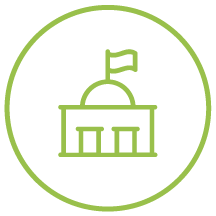
Institutional Arrangements & Coordination
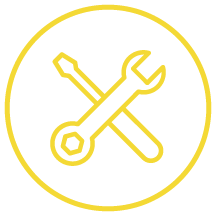
Service Delivery Infrastructure
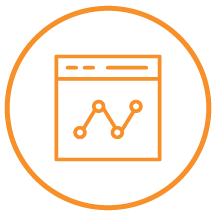
Monitoring

Planning
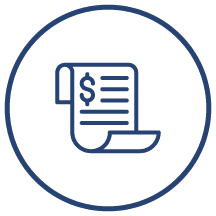
Finance
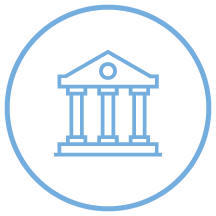
Regulation & Accountability
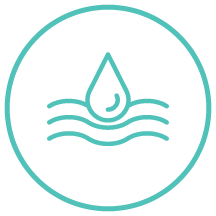
Water Resource Management
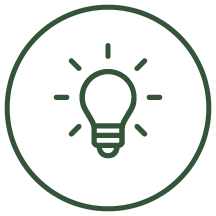
Learning & Adaptation
Resources
Systems Library
Please visit the Aguaconsult, Helvetas, WaterAid, and Welthungerhilfe websites for more information.
National
Local
National

PDF Download
Nepal WASH Sector Review Process: Analysis and recommendations for moving forward
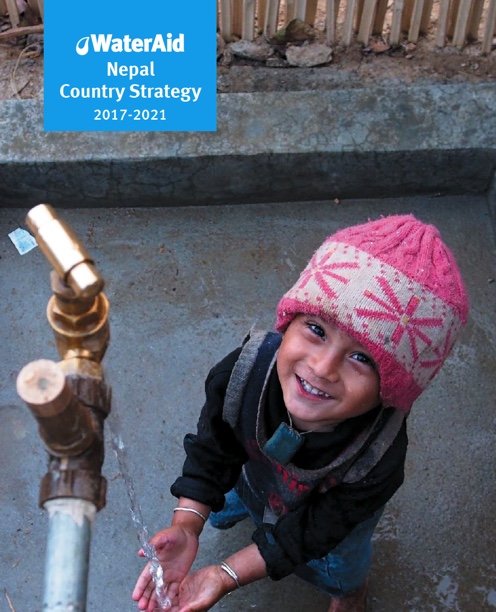


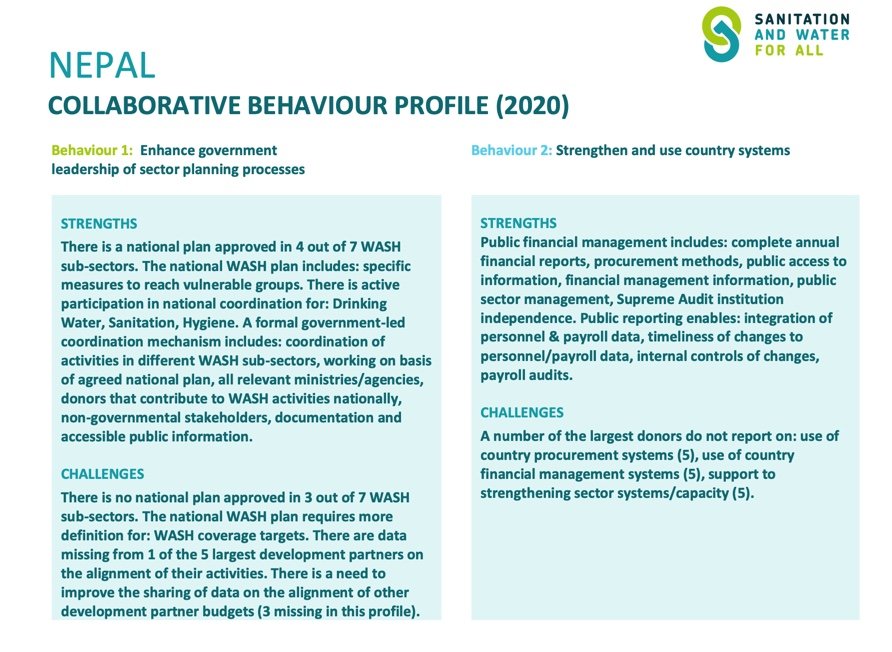



PDF Download
WASH System Research: Identify the strength and capacity gaps across 8 building blocks of WASH system strengthening in 8 local governments of Nepal








